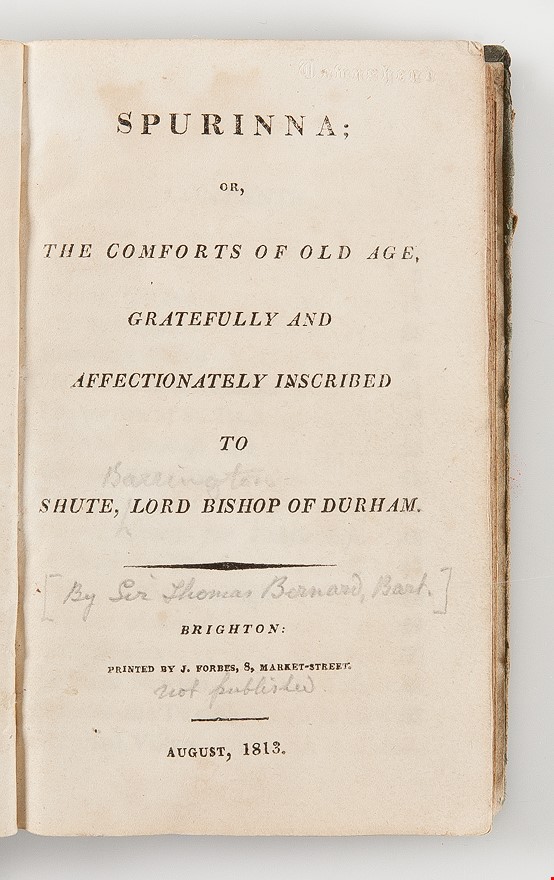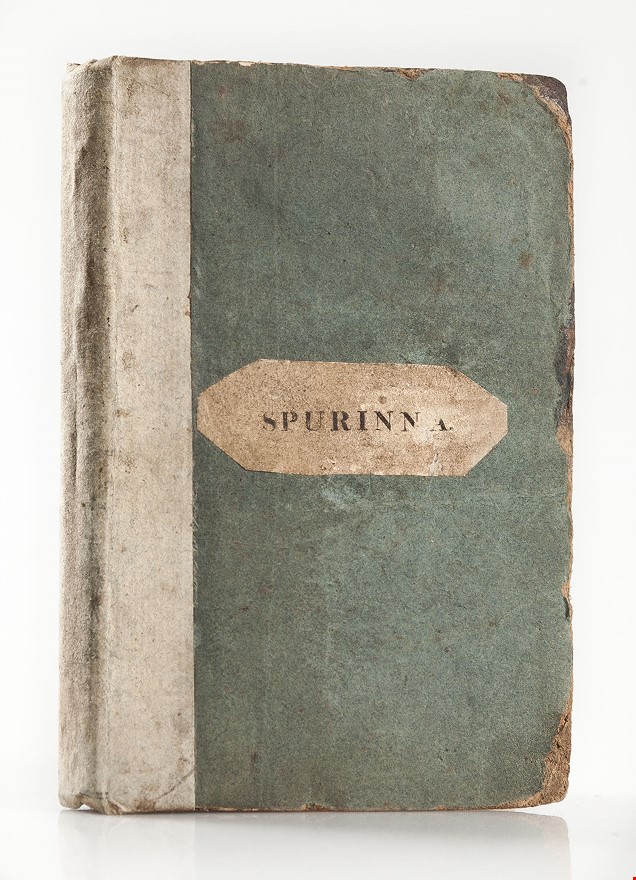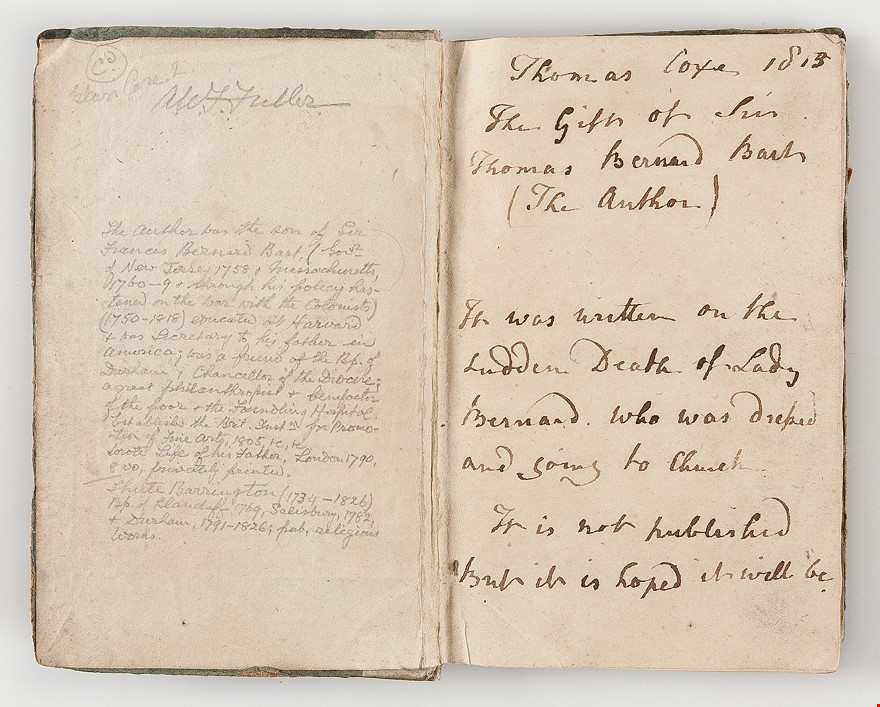Spurinna: or, The Comforts of Old Age, gratefully and affectionately inscribed to Shute, Lord Bishop of Durham.
BERNARD Sir Thomas (1813.)
£2500.00
Available to view at our Curzon Street shop.
First – Privately Printed – Edition. Small 8vo (140 x 90mm)., with the half-title. Very lightly foxed in a few places, a few neat dog-eared corners. Original blue paper covered boards, parchment back, printed paper label in the centre of the upper board (upper board detached, rubbed at the corners and edges, corners heavily bumped and worn, some minor staining, label a little worn with some loss of text). Brighton: by J. Forbes, 8, Market-Street. August,
Rare. Bodley only in the U.K.[no signs of provenance or authorial presentation inscription]; Yale [this copy is reported by the librarian as lost] and Toronto [donated from an anonymous source and with no authorial presentation inscription; bound in handsome brown morocco and tooled in gilt - WorldCat records the date of publication as 1913 but the librarian confirms this is a mistake] in North America.
A privately printed collection – intended to be circulated amongst a small group of friends – of various musings on the subject of old age and mortality. The little book was written in the author’s final years and its composition was interrupted by the unexpected death of his wife.
Bernard complains in his preface to this book that little attention is paid to ones declining years and that rather than fearing ensuing death it is possible to enjoy a happy and fulfilled life to the end. He confidently states that he has been “much gratified to perceive […] that the feelings and affections of the mind may become softer and milder, more kind and benevolent, as the child of immortality approaches the commencement of his spiritual existence” (p.8-9). He continues his preface by noting that the book is composed - in imitation of Cicero - in dialogue form between John Hough (1651-1743), Bishop of Worcester and head of Magdalene College and the Bishop of London, Edmund Gibson (bap, 1669-d.1748) and George Lyttelton, first Baron Lyttelton (1709-1773). He also tells us in the preface that the title of the work is derived from Pliny.
The three characters begin discussing old age with Lyttelton cast as the young man looking to his two older companions for advice. Hough notes - on the subject of diminishing physical strength in old age - that, “I admit, my dear Mr Lyttelton, that my strength is inferior to yours; but your strength is inferior to that of some others; and greatly inferior to what is possessed by those athletic boxers, whose savage combats disgrace the present age” (p.73-4). The subject of the passing away of friends and family is treated in a particularly touching manner. Bernard places the words in the mouth of Hough, but one wonders if he was actually thinking of the unexpected passing of his own wife when he tells Lyttelton, “You did not know her, my young friend. Let me, therefore, indulge myself in a few words to her memory. — Long — long may it be before you experience the interest which i now feel, in bearing witness to the virtues of a departed wife (p.91-2). The passage is given extra poignancy by the fact - noted by Bernard in a footnote - that Lyttleton in fact did come to know the painful feeling of being separated from a wife as his future wife died in childbirth after six years of marriage.
James Baker’s Life of Sir Thomas Bernard tells us that Bernard and his wife had re-located to Brighton in the summer of 1812 for the benefit of her diminishing health. As a diversion, and to lift both their spirits, Bernard had begun writing what would become Spurinna and he enjoyed reading sections of it to his wife. Baker states that Bernard was about half way through the book when, on June 6th 1813, Lady Bernard died. In the manuscript presentation inscription in our copy Bernard notes mournfully that the book “was written on the sudden death of Lady Bernard who was dressed and going to Church” – the inscription gives some sense, despite Lady Bernard’s ill health, that the death came as a shock. The imprint states that the book was published in August of 1813 meaning that Bernard must have completed the work in the following couple of months after her death.
Sir Thomas Bernard was the son of Sir Francis Bernard who was governor of New Jersey and, most famously, Massachusetts. Sir Thomas Bernard was born in England but spent some of his early life in Massachusetts where he was educated at a private school in New Jersey and later enrolled at Harvard. Bernard’s studies were interrupted when his father was removed from his position as governor in 1769. Sir Francis’s time as governor ended ignobly but he had previously raised funds to replace the Harvard College Library after it had been damaged by fire, even presenting some of his own books to the collection.
When Sir Thomas Bernard returned to England he studied at the Inner Temple and was called to the bar but his legal career was hampered by a speech impediment. After his marriage to Margaret (the daughter and coheir of Patrick Adair) he retired from the law and began to pursue various philanthropic pursuits which would interest him throughout the rest of his life. Bernard was an enthusiastic and hands-on governor of the Foundling Hospital. Bernard was primarily concerned over provision for the poor and it was in the spirit that he founded in 1796 (along with a number of other philanthropists including Wilberforce and Shute Barrington) the Society for Bettering the Condition and Improving the Comforts of the Poor. The first general edition of this book was printed in London in 1816 with a note stating “a few copies of this essay were printed in August 1813 for some of the author’s personal friends”. A second edition was published in 1817 as “On the comforts of old age”, The British Critic noted in its review of the book that “we have only to observe, that the reader will here find every subject pleasingly discussed, every argument judiciously introduced and strongly enforced, which have any efficacy in promoting the comforts of old age” (Vol. 42, p.514, 1813). The review continues by stating that the book, “has at present only been circulated among the author’s more particular friends, but we rejoice to hear that he has been prevailed upon to revise it”.
Provenance: 1. Presentation inscription on the initial flyleaf: “Thomas Coxe 1813 / The Gift of Sir Thomas Bernard Bart / (The Author) / It was written on the sudden Death of Lady / Bernard who was dressed / and doing to Church / It is not published / but it is hoped it will be”. We have sadly been unable to trace the Thomas Coxe to whom the book was given. 2. Small gothic-letter blind-stamp in the upper fore-corner of the title-page “Townshend”. 3. Extensive pencil notes by an A.W.J. Fuller on the front pastedown regarding the life of Sir Thomas Bernard and the dedicatee, Shute Barrington. 4. Hans Fellner, (1925-1996), bookseller and book collector, lot 12 in the second part of the sale of Fellner’s library at Chiswick Auctions, West London (26th March 2014).
Stock Code: 213614






